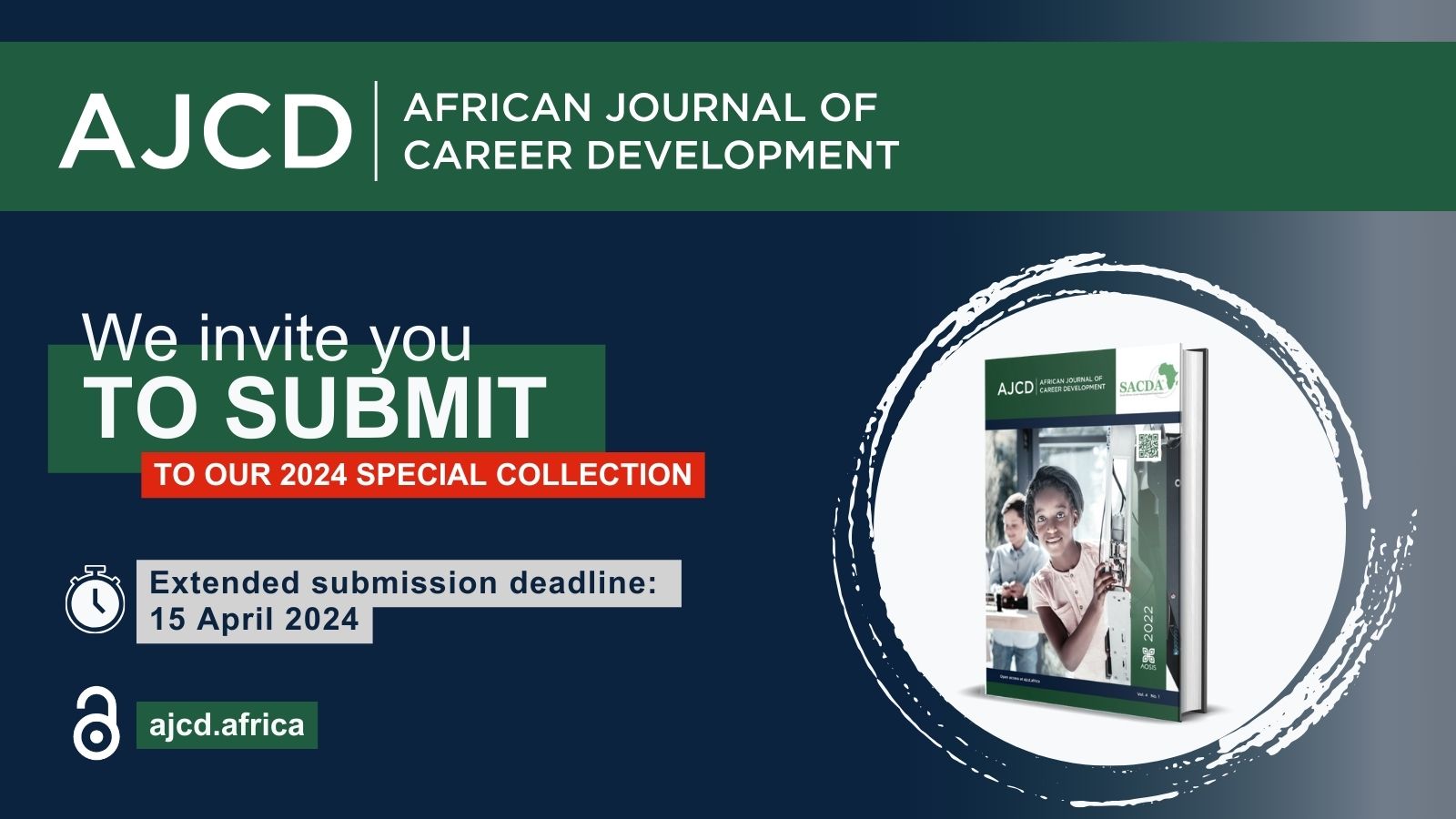African Journal of Career Development 2024 special collection: We invite you to submit
SPECIAL COLLECTION: African Journal of Career Development
AOSIS invites authors to submit their latest research towards the special collection to be published in 2024 in the African Journal of Career Development (AJCD).
Title: Advancing career intervention in developing countries: A call for agency in the 21st century
New timelines:
- Submissions open: 15 September 2023
- Extended deadline for submission: 15 April 2024
- Extended expected publication date: 15 November 2024
Editor-In-Chief: Prof Kobus Maree
Introduction
In this special issue, the focus is on reflecting and informing career development intervention and practice in the Global South-developing countries. It aims to draw from the expertise of practitioners, academics, teachers, and activists who navigate the terrain of providing career development interventions in developing and resource constrained contexts. The need is apparent, and the published literature refers to Global South countries having especially called for research on approaches to career practice and theory that are more harmonious with the conditions of a developing country (Lopez Levers, et al., 2011), rather than to uncritically accept approaches, questionnaires and interventions developed elsewhere in the world. The call for relevance, accessibility, and equitability in developing contexts, characterised by pockets of affluence and contexts where the majority of people are seriously deprived, in the provision of career services in the 21st century warrants the attention of all those involved in both curriculum development and service provision. Global South contexts are thus faced with the reality that interventionists, researchers, activists should cater for the needs of both privileged and disadvantaged groups. It is with this intention in mind that we invite contributions for this special issue.
Objective
In addressing the objective, “advancing career intervention in developing contexts for the 21st-century, the Special Issue, editor invites manuscripts from academics, practitioners, supervisors at internship sites, community engagement scholars, researchers, and interventionists from the Global South (developing contexts) as well as the Global North (developed contexts) to inform a more relevant career counselling curriculum to enhance future practice in developing contexts. We invite authors from the different backgrounds to reflect on the listed topics below.
Recommended Topics
- What are the current practices in providing career information, guidance, and assessment in different settings?
- What approaches to career information, guidance and assessment have been successful in Global North and/or Global South contexts?
- What are the factors that enable and pose as barriers to increase accessibility to career information, guidance, and assessment?
- What models, theories or methods have informed dissemination of career information, guidance and assessment and have been found to be applicable to current Global South contexts in particular?
- What are the successes and possibilities for cultural tailoring of career assessments and interventions in developing contexts?
- How adequately are the undergraduate and/or post-graduate curricula in the Global South aligned to enhancing career development in the 21st century?
- What novel and innovative models can be tailored to promote sustainable decent work for all at a time when automation and digitisation are increasing and contributing to major job losses?
Manuscript Information
Manuscript contributions may consist of the following:
- Manuscript submissions should be in English.
- Original Research articles must fully comply with the journal guidelines for manuscripts (maximum 6000 words, 60 or fewer references with limited self-referencing; no more than 7 table/figures).
- Interested authors must consult the journal’s guidelines for manuscript submissions at ajcd.africa.
Submission Procedure
To submit your article to the African Journal of Career Development, please visit ajcd.africa. When you submit the article, select the ‘Advancing career intervention in developing countries’ as the article type. The submission portal will be accessible on ajcd.africa after login in with your personal user credentials. For more details on the submission procedure, go to https://bit.ly/45O6hEA. All submissions will undergo anonymous review to guarantee high scientific quality and relevance to the subject. The final decision regarding acceptance/revision/rejection will be based on the reviews received from the reviewers and at the sole discretion of the Editor-in-Chief.
Of course, we will be happy to provide you with any assistance during the submission and application process. Kindly enquire at submissions@ajcd.africa.
We would be honoured to receive a positive reply from you and look forward to receiving your article.
All submissions and inquiries should be directed to the attention of:
- V. Rawatlal
- Department of Psychology, Faculty of Humanities, University of Pretoria
- rawatlal@up.ac.za
Accreditation & Indexing
The African Journal of Career Development (AJCD) is DHET accredited and listed on the Directory of Open Access Journals (DOAJ). Articles published in the journal are included in several indexing services. Click here to view the complete list.
About AOSIS Scholarly Journals
Maximise journal impact through open access, expert publishing services, quality peer reviews, and cost-effective production. You can browse the AOSIS open access journal collection per scholarly field and browse by keyword or per author at library.aosis.co.za. All our open access content is free, and available to everyone upon publication. A physical copy can be purchased at the AOSIS Shop.
Open access publishing
We are an open access publisher which means that all content is freely available without charge to the reader. Readers are allowed to read, download, copy, distribute, print, search, or link to the full texts of the books, or use them for any other lawful purpose, without asking prior permission from the publisher or the author, provided that the work is appropriately cited.

